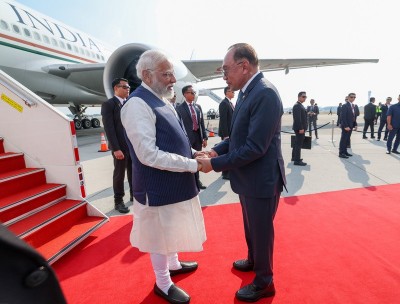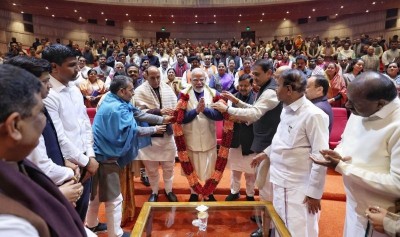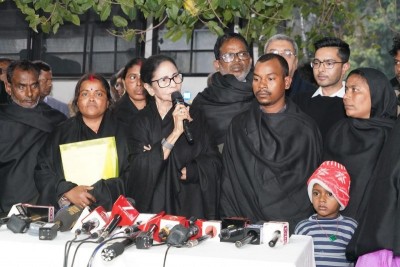 Ukraine War
Ukraine War
The War in Ukraine, and Some Disturbing Questions
No matter who wins, the proxy war between the US led western powers and Russia’s Vladimir Putin is going to change the world order in unexpected and startling ways, writes Ramananda Sengupta
“Falsehood flies, and the Truth comes limping after it; so that when Men come to be undeceiv’d, it is too late; the Jest is over, and the Tale has had its Effect…” Anglo-Irish satirist Jonathan Swift, best known as the author of Gulliver’s Travels.
Vladimir Vladimirovich Putin is in the news for the wrong reasons again. And this time, they raise a few uncomfortable questions about our unipolar world order.

Putin, a former KGB officer who has ruled Russia since 1999, is not a nice man. You cannot be a ‘nice’ man and rule a country like Russia for over 20 years, switching between Prime Minister and President to avoid falling foul of the two consecutive term limits.
Born October 9, 1952 in Leningrad (now St Petersburg) in the former Soviet Union, Putin studied law before joining the dreaded Komitet Gosudarstvennoy Bezopasnosti, better known by its acronym KGB, as a foreign intelligence officer in 1975. He was posted in East Germany when the Berlin Wall fell in 1989, and retired as a Lieutenant Colonel a year later.

Barely eight years later, having acquired a reputation as someone who could “get things done,” he was appointed Director of the Federalnaya Sluzhba Bezopasnosti, or Federal Security Service (FSB), Russia’s internal security and counter-intelligence service and the KGB’s domestic successor, by President Boris Yeltsin in July 1998.
He also served a brief stint as secretary of the powerful Security Council before Yeltsin appointed him as Prime Minister of Russia in September 1999. Three months later, Yeltsin abruptly resigned and named Putin as acting President pending elections in March 2000.

After winning that in the first round with over 50 per cent of the vote, Putin has remained in power since, flipping back and forth as Prime Minister and President to bypass term restrictions.
Putin’s refusal to negotiate with Chechen rebels -- even though it led to the death of 129 hostages and 41 terrorists who had seized the Dubrokva Theater in Moscow after Russian forces piped toxic gas into the auditorium in October 2002; and 300 deaths (including 186 children) when Russian forces stormed a school in Beslan which was seized by Chechen extremists in September 2004– only added to his popularity.
So did his state of the nation address on national television on April 25, 2005, when he described the collapse of the Soviet Union in December 1991 as the “major geopolitical disaster of the century.”

It also puts his decision to invade Ukraine on February 24, three days after formally recognising the breakaway Donetsk People's Republic and the Luhansk People's Republic, two pro-Russian regions in the Donbas eastern Ukraine, into context.
The eastern European nation of Ukraine is a former Soviet Republic and the second largest nation after Russia on the continent. After it declared independence in August 1991, the country maintained close relationship with Russia, and its first president, Leonid Kravchuk, oversaw its transition into a non-nuclear nation, sending the last of over 1900 nuclear warheads it had inherited from the USSR to Russia for dismantling in June 1996.
His successor Leonid Kuchma was probably responsible for Ukraine’s shift towards the west, after tapes released by his former bodyguard revealed that he had ordered the kidnapping of Georgiy Ruslanovich Gongadze, a journalist whose decapitated corpse was found in September 2000.
Shunned by the west, Kuchma pivoted towards Russia, whose leader Vladimir Putin supported him publicly and refused to accept the allegations despite all the evidence. In December 2011, a district court refused to accept the tape as evidence and dropped criminal charges against Kuchma.
Pro-Russian candidate Viktor Yanukovych won the 2004 presidential elections amidst allegations of major electoral fraud and corruption, leading to a major nationwide stir known as the Orange Revolution, and the Supreme Court ordering a revote.

Former prime minister Viktor Yushchenko won that election, and promised to move Ukraine out of the Kremlin's orbit by seeking membership of the European Union and the North Atlantic Treaty Organisation, or NATO.
On 3 April 2008, the Heads of State and Government participating in the meeting of the North Atlantic Council Bucharest released its 50-point declaration. “NATO welcomes Ukraine’s and Georgia’s Euro-Atlantic aspirations for membership in NATO. We agreed today that these countries will become members of NATO,” says point number 23.
But if the NATO leadership thought Putin would allow the two former Soviet Republics which share a border with Russia lying down, it was in for an unpleasant surprise.
After accusing Georgia of "aggression against South Ossetia", a breakaway 4000 sq km state on the Russia-Georgia border in the South Caucasus, Russian troops poured into the region as part of ‘peace enforcement’ operation on 8 August, 2008. On August 9, Russian forces helped Abkhazia, another breakaway state some 400 km to the east of Ossetia launch an attack on Georgia. In both regions, there were widespread attacks on ethnic Georgians, who were forced to flee.
Following a ceasefire agreement negotiated by French President Nicolas Sarkozy on 12 August 2008, Russia recognized Abkhazia and South Ossetia as separate republics on 26 August. Georgia, which severed diplomatic ties with Moscow, maintains they are occupied Georgian territories.

In Ukraine, Viktor Yanukovych returned to power as president in the 2010 elections, only to be deposed again in the massive civilian protests known as the Maidan uprising, which erupted after he refused to sign an association agreement with the European Union in November 2013. (Putin’s decision to cut off energy supplies to the country and block almost all imports from Ukraine may have influenced that decision). In late February 2014, after more than 100 protesters and 13 policemen died in clashes in the capital, Kyiv, Yanukovych sought exile in Russia.
(In early March 2022, Ukrayinska Pravda, an independent online publication, cited intelligence officials as saying that President Putin wants to bring Yanukovych, now 71, back as president once Russian forces take Kyiv and remove the elected president Volodymyr Zelenskiy.
After Yanukovych fled, the new government scrapped a 2012 law that made Russian an official language in Ukraine, despite over 30 percent of Ukrainian population being native Russian speakers. Protests erupted in the Russian-speaking regions of Odessa, Dnepropetrovsk, Kharkov, and the two self-proclaimed Republics of Donetsk and Lugansk. Kyiv reacted by sending troops to quell the violence.
Days later, Russian troops annexed Crimea, a peninsula on the Black Sea which had been transferred in 1954 to the Soviet Socialist Republic of Ukraine by Nikita Khrushchev, who became First Secretary of the Communist Party of the Soviet Union after the death of Joseph Stalin a year earlier.

When the corrupt and badly trained Ukrainian soldiers failed to tackle the uprising in the east, Kyiv hired and deployed paramilitary units comprising foreign mercenaries from over 19 nations, including Switzerland. By 2020, these extreme right-wing paramilitaries numbered about 102,000 men, or about 40 percent of the Ukrainian forces, according to a Reuters graphic.
Trained, funded and armed by the US, UK, Canada and France, they have been operating in the Donbas region since 2014, where over 15,000 people have been killed in clashes between the Russian speaking citizens and the security forces so far. The region has also seen extensive shelling by the government forces on areas held by Russian-speaking rebels.
“Neo-Nazi and white supremacist groups in the United States and Europe have become more active and dangerous in the last decade and have developed a much deeper online presence. This has helped them establish closer transnational contacts. One common preoccupation for both individuals and groups has been the conflict in Ukraine, where a well-established far-right extremist movement and its associated militia have consistently engaged with and welcomed far-right ideologues and fighters from other parts of Europe and North America.” CTC Sentinel, the newsletter of the Countering Terrorism Center at West Point, The US Military Academy. (April 2020, Volume 13, page 30)
The association agreement (which Yanukovych had refused to sign) between Ukraine and the EU was finally signed in 2017, opening markets for free trade of goods and services, and visa-free travel to the EU for Ukrainians. Two years later, popular comic actor Volodymyr Zelenskiy won the March 2019 presidential elections.

Cut to the present crisis, which threatens to destabilize not just the region, but the entire world, with the US-led western powers and Vladimir Putin’s Russia fighting a proxy war in Ukraine.
Putin’s decision to invade Ukraine on February 24 is clearly an aggressive pushback against what he perceives as unrelenting and strategic US and NATO encroachment into Russia’s sphere of influence.
Perhaps he was not expecting the EU, which depends on Russian oil and gas for its energy needs, to rally behind the US so quickly, or the brutal and unprecedented sanctions which followed. But the fact that he has subtly threatened the unthinkable by repeatedly noting that Russia has the largest number of nuclear weapons on the planet, indicates that he is unwilling to back down until his objective of a neutral, if not pro-Russian regime in Ukraine is met.
Meanwhile, disinformation is the name of the game, with each side accusing the other of abominable atrocities. Images of maimed women and children and refugees fleeing the escalating violence have flooded the media, many of them of suspicious vintage.
Jacques Baud, a former colonel of the General Staff and ex-member of the Swiss strategic intelligence who also participated in NATO programs to assist Ukraine, quotes Goethe: “The greater the light, the darker the shadow.”
According to Baud, who was involved in discussions with the highest Russian military and intelligence officials just after the fall of the USSR, “The more the sanctions against Russia are disproportionate, the more the cases where we have done nothing highlight our racism and servility. Why have no Western politicians reacted to the strikes against the civilian population of Donbass for eight years?
“Because finally, what makes the conflict in the Ukraine more blameworthy than the war in Iraq, Afghanistan or Libya? What sanctions have we adopted against those who deliberately lied to the international community in order to wage unjust, unjustified and murderous wars?” he asks.

“Have we sought to ‘make the American people suffer’ for lying to us (because they are a democracy!) before the war in Iraq? Have we adopted a single sanction against the countries, companies or politicians who are supplying weapons to the conflict in Yemen, considered to be the worst humanitarian disaster in the world? Have we sanctioned the countries of the European Union that practice the most abject torture on their territory for the benefit of the United States? To ask the question is to answer it… and the answer is not pretty,” he concludes.
For now, those answers depend on who you ask, and as everyone knows, history is written by the victors, usually because the losers don’t live long enough to recount their version of it.
(Ramananda Sengupta is a foreign and strategic affairs analyst and a consulting editor with IBNS. The view expressed in the article is of the author. He can be reached at ramananda.sengupta@gmail.com)
Images: Xinhua/UNI
Support Our Journalism
We cannot do without you.. your contribution supports unbiased journalism
IBNS is not driven by any ism- not wokeism, not racism, not skewed secularism, not hyper right-wing or left liberal ideals, nor by any hardline religious beliefs or hyper nationalism. We want to serve you good old objective news, as they are. We do not judge or preach. We let people decide for themselves. We only try to present factual and well-sourced news.







